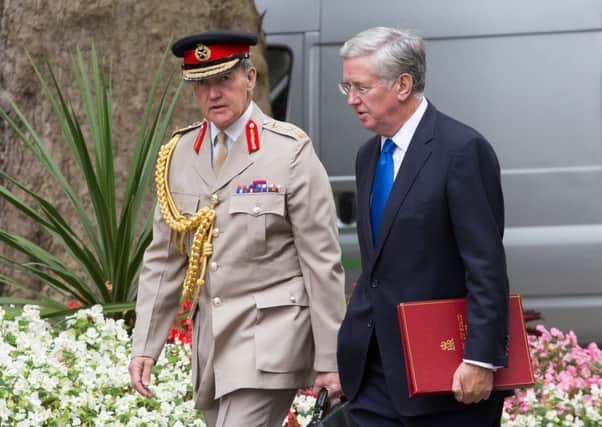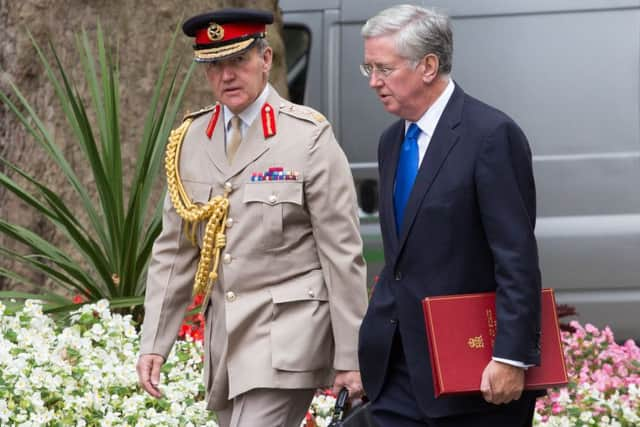Cameron faces calls for British air strikes on Syria


As MPs began heading back to Westminster for tomorrow’s emergency Commons vote on military action against IS in Iraq, senior Tories said that it may not be sufficient to defeat the militants.
Mr Cameron has deliberately restricted Britain’s involvement to Iraq in part to secure the support of Labour, which has raised concerns about extending air raids into Syria without specific authorisation of the United Nations Security Council.
Advertisement
Hide AdAdvertisement
Hide AdThe Prime Minister is desperate to avoid a repeat of last year’s Commons vote on military action when Labour combined with Tory rebels combined to inflict a damaging defeat on the Government.


Unlike Iraq - where Britain is acting at the request of the government in Baghdad - there has been no such request from the Syrian regime of President Bashar al Assad, raising questions over the the legality of any military intervention.
However Conservative backbencher Bob Stewart - a member of the Commons Defence Committee and a former British commander in Bosnia - said that IS had to be defeated in its birthplace in Syria.
He warned that the Government may even have to deploy British ground forces if the threat of terrorist attacks in the UK by IS was considered to be sufficiently dangerous.
Advertisement
Hide AdAdvertisement
Hide Ad“You have got to go to the eye of the octopus,” he said quoting the US civil rights activist Stokely Carmichael, “and the eye of the octopus isn’t necessarily in Iraq, it is in Syria”.
He told BBC Radio 4’s The World at One: “I am not one who will say that we will never ever put infantry on the ground. The truth is, as everyone knows, the only way to get rid of this menace is to beat on the ground, drive them out, annihilate them or capture them.
“We mustn’t rule out the option of using our armed forces if our country is threatened enough that we need to do so.”
Former defence minister Sir Gerald Howarth expressed concern that in limiting British action to Iraq, the UK was leaving the must difficult element of the operation to the United States which has already attacked IS targets in Syria.
Advertisement
Hide AdAdvertisement
Hide Ad“If you don’t attack their bases in Syria, then clearly you are not addressing it,” he told The World at One. “One will be left with the taste in the mouth that we are leaving it to the Americans to do the dirty end of the job.”
Earlier, Deputy Prime Minister Nick Clegg insisted that there would be no British combat forces “on the ground” and that extending air strikes against IS into Syria would require a further Commons vote.
“If we were to decide to play a fuller role beyond Iraq and in Syria then we would go back to Parliament for another debate and a vote,” he said on his weekly LBC radio phone-in.
While some Conservatives were pressing for stronger action, others expressed caution.
Advertisement
Hide AdAdvertisement
Hide AdJohn Baron, a leading Tory rebel in last year’s Commons vote, said that ministers needed to explain their strategy more clearly - including the role of the Iraqi army and other regional forces.
“Most accept that air strikes alone will not destroy or defeat IS, as we have already seen. So what is plan B regarding regional ground forces?” he said.
“Without the Iraqi army taking and holding ground, air strikes alone could prove ineffective and, at worse, counter-productive.
“But there is no sign that the 250,000 strong, well-armed, Iraqi army has got its act together. If this remains the case, what is the exit strategy? Soldiers can only buy time. The solution has to be political.”
Advertisement
Hide AdAdvertisement
Hide AdLiberal Democrat former leader Sir Menzies Campbell said IS is carrying out “systematic barbarism”, adding: “Effectively there’s ethnic cleansing going on.”
Speaking about tomorrow’s vote, he told Sky News: “I am satisfied there are perfectly sound legal grounds for Britain joining military action.
“The request has been made by the Iraqi government, the very future of Iraq is at stake and we’re quite entitled to adopt and accept that request and to become involved.
“The second question is whether or not it is the right thing to do and of that I am satisfied as well because it’s pretty clear that Isis, or whatever we call them, are wholly barbaric and they are causing very, very considerable instability throughout the region and creating a very, very difficult humanitarian problem.”
Advertisement
Hide AdAdvertisement
Hide AdThe Cabinet has been been meeting in Downing Street to discuss the exact wording of the motion to be debated by MPs in tomorrow’s debate.
Last night, Mr Cameron, attending the United Nations in New York, warned that Britain must not be so “frozen with fear” of repeating the mistakes of the Iraq War that it failed to take on the “psychopathic, murderous, brutal” jihadis of IS.
“We are facing an evil against which the whole world must unite. And, as ever in the cause of freedom, democracy and justice, Britain will play its part,” he said in an impassioned address to the UN General Assembly.
Overnight, US-led air strikes targeted Syrian oil installations held by IS, reportedly killing almost 20 people.